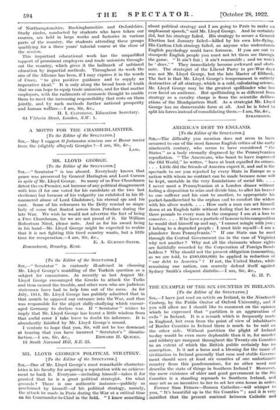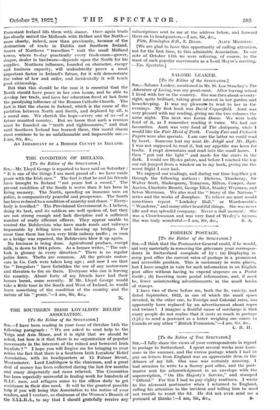THE EXAMPLE OF THE SIX COUNTIES L's1 IRELAND. [To the
Editor of the SPECTATOR.] have just read an article on Ireland, in the Nineteenth Century, by the Public Orator of Oxford University, and if you will allow me I should like to comment on the opinion which he expressed that " partition is an aggravation of evils " in Ireland. It is a remark which is frequently made in England, but even from the point of view of inhabitants of Border Counties in Ireland there is much to be said on the other side. Without partition the plight of Ireland to-day would be even more deplorable than it is, for murder and robbery a1re rampant throughout the Twenty-six Counties to an extent of which the British public certainly has no conception. Is it not a boon and a blessing for the cause of civilization in Ireland generally that sane and stable Govern- ment should save at least six counties of one unfortunate country from this pandemonium, for no other word can describe the state of things in Southern Ireland ? Moreover, the mere existence of older and good government in the Six Counties is a standing reproach to Southern Ireland, and may act as an incentive to her to set her own house in order. Former Sinn Feiners--Roman Catholics—will whisper to you, " It's beautiful up in the Six Counties " ; and it is very manifest that the present contrast between Catholic and
Protestant Ireland fills them with shame. Once again trade has closely united the Midlands with Belfast and the North— snore closely, indeed, now than previously, because of the destruction of trade in Dublin and Southern Ireland. Scores of Northern " travellers " visit the small Midland towns, where to-day practically every tradesman—grocer, draper, dealer in hardware—depends upon the North for his supplies. Northern influence, founded on character, energy and business capacity, will undoubtedly prove a most important factor in Ireland's future, for it will demonstrate the value of law and order, and incidentally it will teach good citizenship. But that this should be the case it is essential that the North should- have peace in her own house, and be able to develop her trade, and have her education freed at last from the paralysing influence of the Roman Catholic Church. The fact is that the chasm in Ireland, which is the cause of the partition between North and South, and deplored by all, is a moral one. We cherish the hope—every one of us—of a future reunited country. But we know that such a reunion must be founded on " truth and righteousness," and that until Southern Ireland has learned these, this moral chasm must continue to be an unfathomable and impassable one.— I am, Sir, &c.,
AN INHABITANT Or A BORDER COUNTY IN IRELAND.











































 Previous page
Previous page